Obama Administration Abandoning Program To Train And Equip “Moderate” Syrian Rebels
In the wake of failure that could have been easily foreseen, the Obama Administration is ending a program to train so-called "moderate" Syrian rebels.
The New York Times is reporting that the Obama Administration will be abandoning one of the central elements of its current strategy in the effort against ISIS, thus throwing the entirety of American policy in the region into doubt:
LONDON — The Obama administration has ended the Pentagon’s $500 million program to train and equip Syrian rebels, administration officials said on Friday, in an acknowledgment that the beleaguered program had failed to produce any kind of ground combat forces capable of taking on the Islamic State in Syria.
Pentagon officials were expected to officially announce the end of the program on Friday, as Defense Secretary Ashton B. Carter leaves London after meetings with his British counterpart, Michael Fallon, about the continuing wars in Syria and Iraq.
“I wasn’t happy with the early efforts” of the program, Mr. Carter said during a news conference with Mr. Fallon. “So we have devised a number of different approaches.” Mr. Carter added, “I think you’ll be hearing from President Obama very shortly” on the program.
A senior Defense Department official, who was not authorized to speak publicly and who spoke on the condition of anonymity, said that there would no longer be any more recruiting of so-called moderate Syrian rebels to go through training programs in Jordan, Qatar, Saudi Arabia or the United Arab Emirates. Instead, a much smaller training center would be set up in Turkey, where a small group of “enablers” — mostly leaders of opposition groups — would be taught operational maneuvers like how to call in airstrikes.
While many details of the new approach still need to be worked out, President Obama endorsed the shift in strategy at two high-level meetings with his national security and foreign policy advisers last week, several American officials said.
The change makes official what those in the Pentagon and elsewhere in the administration have been saying for several weeks would most likely happen, particularly in the wake of revelations that the program at one point last month had only “four or five” trainees in the fight in Syria — a far cry from the plan formally started in December to prepare as many as 5,400 fighters this year, and 15,000 over the next three years.
Already, the Pentagon has announced it was “pausing” the transfer of trainee candidates in Syria to training sites in Jordan and Turkey. Several dozen opposition fighters already at the training sites are likely to complete their instruction — learning to help call in allied airstrikes and operating 122-millimeter mortars — and they will be placed in opposition groups in Syria to enhance their combat effectiveness, officials said.
“Training thousands of infantry was not the right model, I think that’s become pretty clear,” said another senior administration official, who spoke on condition of anonymity to discuss internal planning.
The official said the training was “to be suspended, with the option to restart if conditions dictate, opportunities arise.” The official also said that support to Sunni Arab fighters in eastern Syria was an example of focusing on groups already fighting the Islamic State, also known as ISIS or ISIL, “rather than using training to try to manufacture new brigades.”
The shift in strategy comes as critics in Congress have increasingly demanded that the administration make changes or face the elimination of the program altogether.The
In a letter to the State Department, Pentagon and C.I.A. last week, four senators — three Democrats and a Republican — criticized the program. “The Syria Train and Equip Program goes beyond simply being an inefficient use of taxpayer dollars,” the senators wrote. “As many of us initially warned, it is now aiding the very forces we aim to defeat.”
The senators — Christopher S. Murphy, Democrat of Connecticut; Joe Manchin III, Democrat of West Virginia; Tom Udall, Democrat of New Mexico; and Mike Lee, Republican of Utah — were referring to the latest debacle to plague the program.
From the beginning, the strategy of finding and training so-called “moderate” Syrian rebels who would by allies in the fight against ISIS at the same time that they are allied with ISIS in an effort to depose the regime of Bashar Assad has been one that never really seemed to make a whole lot of sense. For one thing, it has never really been clear just how “moderate” these rebels actually were. While the groups themselves were not in formal alliance with ISIS or al Qaeda, many of them seemed to hold views that were basically compatible with those organizations, and they certainly don’t seem to be all that interested in the idea of a democratic, pluralistic Syria that includes not only its Sunni and Shia Muslim populations, but also the Christian and Alawaite communities that make up a substantial part of the population in the eastern part of the country. That was one of the many reasons why President Obama was obviously so reluctant to actively start arming the rebels even while advisers like Hillary Clinton, people on Capitol Hill like John McCain, and allies in Saudi Arabia and the Gulf States argued otherwise.
Two years ago, even the nonlethal aid we were providing to rebel groups was cut off when evidence began to surface that Islamist elements were gaining a foothold among the so-called “moderates.” As the war dragged on, President Obama eventually gave in to the pressure and announced a policy to arm and train these so-called “moderates,” but as I noted at the time it was obvious that the plan could not work for many of the same reasons that people were arguing against arming them when the war started. The President’s plan was quickly attacked by many experts, primarily because it was clear that his faith in the “moderates” was completely misplaced. It was also clear that, despite the arguments made by many of the advocates of the President’s plan, arming these groups would not have prevented the rise of ISIS, not the least because there was a long history of the arms supplied to “moderates” ending up in the hands of radical groups, a practice that continues to this day. There were also reports that one of the groups that were part of this supposed “moderate” coalition sold American journalist Steven Sotloff, to ISIS at some point after he was captured. Sotloff was eventually beheaded in one of the infamous propaganda videos that ISIS was releasing last year. Within three months after the President announced his new strategy, it was clear that whatever trust should have been placed in the “moderate” Syrian rebels was entirely misplaced and that the strategy he had announced in the summer of 2014 was doomed to fail. Finally, over the summer, the true extent of the failure of the program became clear with the announcement that no more than sixty, and perhaps as few as five, actual fighters have been successfully trained by the American-sponsored program. Given all of that, the announcement that we’re abandoning what is clearly a failed idea was largely inevitable.
The big question, of course, is where this leaves American policy against ISIS going forward. Apparently, the Administration plans to announce some kind of replacement for the Train and Equip Program that would be based in Turkey but it seems as though this will be a much lower scale program than the already low scale program we’ve been undertaking for the past year. This would suggest that we’ll be relying mostly on air power going forward, which of course raises the possibility of unintended confrontations with the Russians also using air power to attack rebel positions as part of their plan to defend the Assad regime. Most importantly, though, this development just seems to reinforce the idea that there is no coherent strategy in Syria from either the United States or Russia, and that we’re pretty much flying blind at this point. That’s a recipe for disaster.
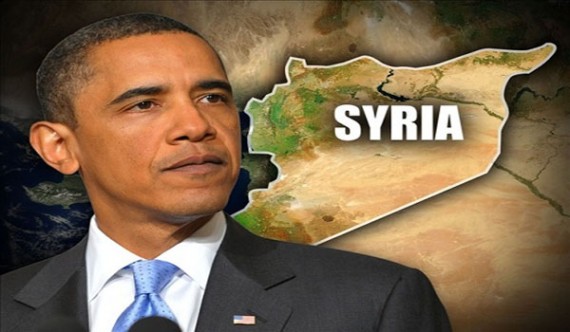


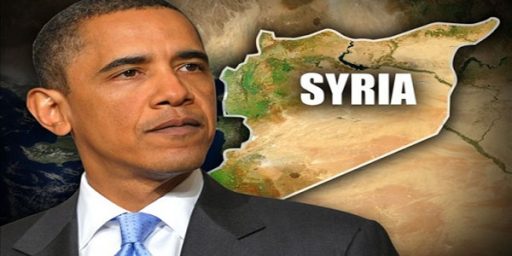
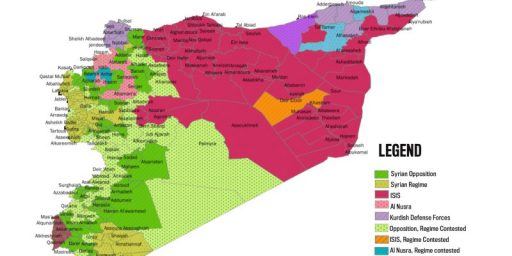
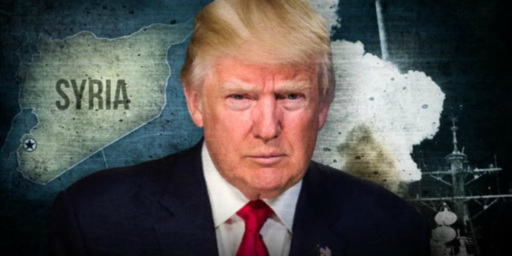
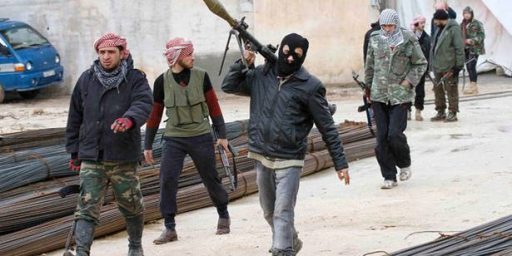
I the very coherent strategy of don’t do anything stupid…this seems rather benign. Unless your suffering from ODS and don’t want to do any more posts on the Republican Death Spiral
Something big and potentially fascinating is happening. Russia is effectively picking a side in the endless Sunni-Shia conflict. Russia has chosen Assad, Iran, Hezbollah and Iran’s pimps in Baghdad.
I suspect that’s going to turn out to be really stupid since Chechens and Kazakhs are Sunni. And so are Nusra and Al Qaeda and ISIS. But hey, go for it Vlad. I’m sure it’ll all work out just fine.
As for our “moderates” here’s the thing: there’s no such thing as a moderate in the middle of a civil war. It was stupid to imagine there was. There are people who hate Assad more than ISIS, and there are people who hate ISIS more than Assad, and those groups mirror the intra-Islam split that we keep being told isn’t really important. Right.
As opposed to the neo-cons, who would insist that we double down?
I’m reminded of General von Rundsteldt’s answer to Hitler after a German attempt to drive back the Western allies failed after the D-Day landings. When asked what should be done next, von Rundsteldt barked : “Surrender, you fool. What else can we do?”
I’m not sure that we can do anything in Syria right now, other than let Assad, Iran and Russia have their way. The problem is that would greatly greatly increase the refugee outflow into Europe, which would destabilize the EU. ( There would be a refugee flow into the USA as well, inevitably stoking anti Muslim feeling here).
Doing nothing hasn’t worked. The Syrian crisis has continue to spiral out of control, making things worse over a wider and wider area. But the few things the USA has done have all failed. Maybe we should just stand pat and see if Assad, Iran, and Russia can build a stable state on the bodies on the bodies of hundreds of thousands of more Syrian dead.
Has the US military had any success training and equipping any forces, anywhere? Off the top of my head, I can’t think of any. Since we have demonstrated it is not a core competency of our military, then we need to stop doing it.
This embarrassing news, of course, announced quietly on a Friday, the standard day for telling the truth when fewer people are paying attention.
Obama makes Jimmy Carter look like a genius.
I fear we will be blundered blindly into another general war, and I have no confidence that we will prevail. He truly is that stupid.
@Scott:
I would say the Mujahadin in Afghanistan during the Soviet invasion, but that was mostly a CIA operation.
@OldSouth:
Uh…
Does it register that arming the rebels WAS blundering into the civil war? And that this represents something of a disengagement from the civil war?
You know what, nevermind.
@Scott: Well, there were the Montagnards.
Yeah, it’s been a while.
But seriously: The US military takes snot-nosed kids from all walks of life and molds them into members of history’s most effective military in a matter of weeks. The problem isn’t with our NCO corps and its ability to train people, it’s with our leadership choosing the wrong people to train.
It’s not that the members of foreign forces are stupid–most aren’t, even if many are not highly-educated. They’re certainly trainable, for the most part. The problem is they aren’t motivated to fight. They don’t see the point in dying for whoever America has decided they should be dying for. Many of them have murky and divided loyalties. Many have tribal affiliations that long predate and far exceed any 20th century, Western-imposed national borders. Nearly all lack the fanaticism that drives our enemies.
We could be–and probably are–the most effective military trainers in all human history, but we’re trying to train people who simply aren’t willing to put that training into actual practice. And who can blame them? If you were an Afghan but not part of one of the government’s crony groups, would you want to fight for it? If you’re an Iraqi, do you want to die for that utterly corrupt and venal government? Of course not. You don’t want your family done in by ISIS fanatics, either.
So I don’t really blame them. I blame our leadership for not recognizing the futility of trying to mold them in our image.
This isn’t a huge surprise. I’m pretty sure I saw Samantha Power on some Sunday morning talking head show admit it wasn’t working a couple weeks ago. The only reason it might be a surprise is noted by GR’s post above: namely that we’d usually double down on something that wasn’t working rather than abandon it.
@stonetools: I’m not sure that we can do anything in Syria right now, other than let Assad, Iran and Russia have their way. I think that is exactly what we should do. The first thing is to stop any US combat aircraft flying in Syrian airspace. The last thing needed now is an inadvertent fight with Russian aircraft.
@Franklin: I was thinking of the absolute mess we made of Iraq, what with the Ayn Rand wannabes that the neocons put in charge of everything.
They didn’t even have a working government and we were worrying about the Iraq stock market. Dear God.
@Doug Mataconis: “I would say the Mujahadin in Afghanistan during the Soviet invasion, but that was mostly a CIA operation.”
And that certainly worked out well for us in the long run!
Will the Obama administration be training and equipping the moderate Republican rebels in their civil war?
I’m glad that the Obama Administration has recognized the velocity at which the rebels against the Syrian government they’d supported were surrendering to Al Qaeda-affiliated factions, turning over their arms to them, and, in some cases joining them. The net effect was that we were training and arming Al Qaeda-affiliated groups which I’m confident was not the Administration’s intent.
The question now is what to do going forward. As I’ve mentioned at my site, in practice there are only three factions in Syria now: the Syrian government, the Al Qaeda-affiliated factions, and the factions affiliated with DAESH. Some would say four factions and add in the Kurds.
We need to decide what our objective in Syria is and what sort of Syria we’d like to emerge. IMO anyone who thinks that a Syria dominated either by Al Qaeda or DAESH is a step in the right direction is kidding him- or herself.
@Doug Mataconis:
And we didn’t really train them, we just equipped them.
@Dave Schuler:
I have said-and still believe-that the eventual outcome for Syria-Iraq is partition:
Kurdistan-northern Iraq and now, northwest Syria
Shiastan-southern and eastern Iraq
Sunnistan-Eastern Syria and western Iraq
Alawistan-A rump Syrian state, confined mostly to the coast but with a possible salient extending to Damascus and maybe to the Golan Heights.
I think it’s likely that Russia , after it takes some casualties, is going to tell Assad , “Give up on your dream of holding all of Syria and retreat to a coastal enclave. Also cut a deal with Kurds signing away the northwest (which you don’t have any more anyway) in return for help against the Sunni jihadists.”
Where is the USA in all this? Why, nowhere, of course. It has (and will continue to limit its involvement to some bombing of ISIS. However, it will be on the sidelines while Assad, Russia, Iran, and the Kurds decide the fate of Syria. The main US role will be as a second destination for Syrian refugees after Europe is exhausted and puts up the barriers.
@Doug Mataconis:
Might have been a bit too effective that time.
@stonetools:
You may be right but I don’t think that would prove to be an even vaguely stable configuration. Turkey wouldn’t accept a Kurdish state abutting their territory. A land-locked “Sunnistan” would be very problematic. And then there’s the problem of the oil.
I suspect the other description of that configuration is “permanent civil war” with all of the attendant problems. A permanent civil war fought with muskets is one thing. A permanent civil war fought with modern weapons, including CBRN weapons is something else again.
@Dave Schuler:
They tolerate Iraqi Kurdistan. I suspect they would tolerate it if Iraqi Kurdistan added on northeast Syria.
I don’t think there can be a permanent civil war. It’s just too costly and destabilizing. I foresee some settlement eventually.
“thus throwing the entirety of American policy in the region into doubt:”
Is a very silly thing to write. The entirety of US policy?
@michael reynolds:
Little less faux wisdom perhaps.
(1) Nothing is endless about the Sunni-Shia conflict, which is in fact largely a Gulf region affaire as much about Gulf Arab versus Persian power as anything. Outside of the Gulf and Pakistan/Afghan area (by ricochet of Gulf arab influence), it is much less meaningful.
(2) The Kazakhs have their own bloody country, it’s not insightful nor well informed to mix Chechens with Kazakhs – nor are the Central Asian muslims much exercised about the Shia as such. You might have been better served to say Tatars or Azeris. The impact of Russian nastiness directly in the Caucasus, and their direct colonial control of the ‘republics’ is rather more meaningful than far away Syria. Even in the Caucasus, there is rather little Shia-Sunni rivalry versus internal Sunni (traditional Sufist oriented Shafi rite practitioners versus Salafist teaching).
@Mikey:
The problem your training has is that you are focused on recreating American style bureaucratic military configurations. All well and fine if you have something approaching a modern state to work with, with reasonable internal coherency.
However, that is not a condition that widely obtains in the developing world.
The US has a perfectly excellent training programme and organisational matrix, well adapted for the social assumptions of a unitary republic. Rather poorly adapted to other circumstances.
Your phrase here is the key: “I blame our leadership for not recognizing the futility of trying to mold them in our image.” Perhaps you should extend the blame more widely as it is quite clear that the leadership reflects a wider cultural blindness at the national level.
@michael reynolds: The Syrian rebels look for a clear sign from the US officials. But in Syria there is anything but clarity. It is a “whos on first , what’s on second” * deal. No one is sure what the Russian strategy is. Their missiles have hit Iran.
Accident ? Who knows. One thing is certain: Russia wants control, and Russia looks out for Russia. The bear from the north has awoken and is on a hungry prowl for strategic locations and control.
We long for a leader in that area with the stature and skill of General Allenby. Do we have a military leader like him ? Dempsey perhaps ? One thing about it, if Allenby and Lawrence were around, things would be different.
The US would be wise to keep their hand close to the vest. “When a bar fight breaks out, take no sides but get under a strong table. Let everyone else take the hits” This is not the time or place for hasty, hot shot moves.
See: Allenby in Damascus.
* famous scene in a classic Abbott and Costello movie.
@Lounsbury:
As an example of that, the NGOs that we and the Europeans support are also working under Western cultural assumptions. Preaching the gospel of birth control and women’s rights is no less subversive than preaching the Christian gospel was a century ago.
@Lounsbury:
Yeah, there seems to be a kind of implicit assumption that what works well for us should work equally well everywhere, or at least give us some advantage going in.
I do think our terrible experience in Iraq has woken a lot of people up to how wrong that is. At least I hope so.
@Dave Schuler:
Mostly, but as I have observed, the NGOs seem to chase donor money and adjust themselves to donor fads.
Eh, what?
Not really. In fact this comment fairly betrays the exact cultural parochialism, only in a different form, that tends to trip these efforts up.
There has been plenty of good population interventions that root themselves in local referents (not my concern, I just happen to have an old friend who is in this field). Work in W. Africa with local religious leaders, Imams and priests, has proven quite useful. Imperfect but useful. The key of course in this lesson is the greater, more enduring success is for an objective, look to root it in some local cultural framework, even if that means not achieving current Western cultural-norm-fads.
There are, of course, plenty of blundering self-referential programs – I am rather more familiar with the economic sphere but regardless…
@Mikey:
I would attribute this to not having much exposure to other social models. Big country effect perhaps the most significant driver. The Financial Times had an interestng comment last week on the business side, commenting on examples of US businesses being tripped up by Rest of World adopting business model ideas actually developed in USA but neglected (car mfgs, apparel makers and retailres) and then ignored by American businesses until a heavy hit is taken.
@Lounsbury:
You know dude, for a guy who thinks he knows a lot you’re wrong a lot.
We’ve been hearing since Gulf 1 that it wasn’t Shia vs. Sunni and it keeps right on being Shia vs. Sunni. As for the Kazaks and their own bloody country, Afghanistan was also not Saudi Arabia and yet from where did Al Qaeda stage their attacks? Right.
Hezbollah also has its own bloody country and are they staying in Lebanon? No.
You’re a secular guy, you no doubt deal with secular businessmen who no doubt pooh pooh all this sectarianism. That’s comforting to those folks. And yet, match the sides to the sects in Syria and Iraq and what do you get? Shia on one side, Sunni on the other and no crossover of significance to suggest any more compelling interest beyond sect.
50 tons of military weapons airdropped into Syria? So now Obama is supplying ISIS directly?
@michael reynolds:
No, I am not wrong a lot. Particularly not about the areas of my own expertise. Nor do I make fundamental factual errors.
You, however, do.
No, it keeps on being Gulf Arab versus Persian / Mesopotamian- where Shia and Sunni map rather closely on the ethnic-linguistic alliances.
Aside from the Salafist Gulf Arab export of their Shia hatred to various Salafist-Takfiri cells (that equally hate Sufis, etc), the pattern outside of that region is not permanent Sunni-Shia hatred. In fact Sunnis outside of the Gulf & Mesopotomia/Levant are somewhat bemused by the idea, tending as they do to unitarian (all of us are Muslims, so chill out) views.
Yes war torn Afghanistan with a decades long history of close Saudi origin involvement in Salafist Takfiri armed combattant groups.
Now we can contrast this with Kazakhstan which…. has none of those relevant factors. Indeed the Central Asians republics consistently rather lack the Afghan social and ethno-linguistic war situation (not that they’re wonderful in and of themselves)
But you did mention it in a specific context, the Russian, with the Chechens and rather evidently had the simple minded and simplistic idea that somehow a Russian action in Syria would be particularly provacative to the largely (but not entirely) Sunni population of Kazakhstan (and why not Tajikstan, Uzbekistan and Kyrgizstan… I suppose you got confused about who is an independent state, but in any case), whereas the bloody oppression the Russians have run over the past twenty years or so against the Chechens and their ethnic cousins (including Turkic cousins) somehow has gone unnoticed…
A rather queer proposition really.
Even more queer that some how the Chechens and the other Sunnis of the Caucuses should be particularly provoked by Russian bombing in Syria, apparently this being more irritating than getting bombed and shelled directly by the Russians.
Actually Hezbullah does not have its own country, insofar as they do not run Lebanon. But they do effectively stay in their own sphere of concern – which is precisely the Shia dominated regions of the Levant that are their precise and immediate neighbours.
.
Indeed I am secular. I am also rather well learned about the actual religion in question and speak its language of revelation. I do not need to have 3rd hand analytical access to the discourse.
But that is neither here nor there.
A fine sweeping statement from a rather superficial understanding of both the specific conflict and the global distribution of Islamic sects, beliefs and patterns of interaction.
That a specific conflict has gotten a specific theological dressing is not trivial. It does not remove either the profound underlying reasons.